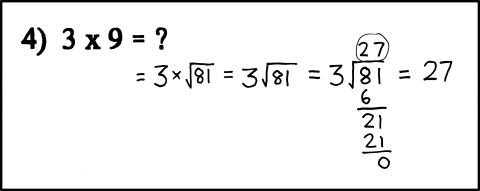Yglesias and Drum weigh in on this great post by Kay Steiger about online education. Here's Matt:
However, hard science and mathematics are on another level, and I think Matt's choice of example is illustrative. That stuff is difficult, for all but a select few—and I mean a select few even among math professors. My two worst grades in college were both math classes, and it was because I didn't really understand how to learn. If you're reasonably intelligent, you can kinda skate through everything in most high schools (indeed, probably a lot of colleges too) without having to struggle. Even if you have a lot of work, it's often a lot of clock-punching stuff, writing papers and so forth, rather than getting annihilated by a single problem. I'm not saying, by the way, that writing papers or whatever you do getting a sociology degree is easy, just that it's a different kind of learning.
Here's what I'm talking about. Before I took math at Reed I had never had the experience of opening my homework, looking at the first problem, and staring at it with increasingly terrifying incomprehension. Sweat beading on my forehead, pages filling up with failed attacks, finally admitting to myself that I. Do. Not. Fucking. Understand. Going to the professor, who explains gently in a dozen different ways I still don't grasp, who finally just advises me to give a rest for the night. Walking back to my dorm near tears, gritting my teeth and repeating fuck under my breath for about an hour.
People usually get a kind of complex at this point. I convinced myself that, despite all my test scores and whatnot, that I was really just kind of dumb at higher math. (I think most people believe this.) I basically went into survival mode, and made it through that class and the next one having only the foggiest idea of what we were actually talking about, often just pattern matching and symbol pushing (which can get you surprisingly far):
A physics professor named Johnny Powell convinced me that I was basically being a self-pitying dope. He definitely wasn't the famousest professor, or the greatest researcher, or the most brilliant lecturer. He'd get lost in lectures sometimes, actually, and get bailed out by the quicker students. What he had, though, in addition to being one of the kindest and friendliest people I've known, was an excellent incentive structure in his class. He had these things called "lecture tickets," which were like 50% of the grade, where you had to take a look at the content for the upcoming lecture and take a crack at some of the easier problems. If you didn't do them, you'd fail, but if you took a reasonable shot and couldn't get the right answer, you'd still get credit. Lo and behold! I got approximately 11,000% more out of those lectures than any before or since. Having grappled with the topic beforehand was immensely beneficial; for the first time I was nodding along with every point and having those little aha! moments all the time.
Going to his office hours was great, too. I think that really brilliant people (I'm talking the ones with steam coming out of their ears) often make terrible teachers, because they don't understand what it's like to get just steamrollered by an allegedly easy problem. Johnny was great because he worked at—or could slow himself down to—my speed; he'd get lost on tangents, screw up signs, forget a step occasionally, and in the process teach me way more than I ever got out of any other physics class.
To get back on track, the lecture tickets were the key. I slowly began to realize what should have been stupidly obvious—that math is really hard, and requires a lot of work, all the time. Not just any old work, the kind of grinding death march that left me shaking in existential terror. I had to get through that kind of stuff day after day without getting distracted, losing hope, or deciding that really I wasn't cut out for math. But it worked! For me, it couldn't be once-a-week homework, it had to be before every lecture. And, after awhile, it started to get easier, or at least more familiar.
That kind of structure seems difficult to replicate for an online model. The big one that got me out there doing that work was fear of failure, which would entail serious social consequences from friends and family, as well as whatever money might be wasted. You'd have to have a serious interest in math to make it without those threats hanging over your head. (Or, you could be a super genius.)
There’s just a basic problem with the general incentives-focused view of the world. Investing some time during the years 15-22 to equip yourself with a quantitative analysis toolkit is something that’s definitely rewarded in the marketplace. And you can find all the relevant textbooks, lectures, information, etc. online already. And yet the number of people who’ve self-taught calculus is tiny. I personally left off my math learning after taking the AP Calculus test in high school and sometimes toy with the idea that I ought to learn more math. After all, I pretty frequently find myself writing about studies that use quantitative techniques I don’t really understand. I even downloaded an MIT lecture course off iTunes for free to refresh my existing base of math knowledge and lay the groundwork to pursue it further. But did I actually watch the lectures, study, and learn the stuff? Of course not!Drum:
Professors lecturing in front of whiteboards may not seem very whiz bang in the era of Facebook, but the medium is definitely not the message here. Aside from the social virtues of a physical college campus, its real virtue is that it sets up a commitment structure: you feel obligated to go to class, and once you're in class you feel obligated to do the homework, etc. Even at that lots of students don't go to class and don't do the homework, but lots do. But if you're studying online, you have to self-motivate at a much higher level. And it's a level that, frankly, most of us just aren't capable of.I think this is less true of things like history. Anyone who can read well can find primers on, say, American history out there that are just amazingly good, easy to digest, and fun to read. Probably a bit tiresome to plow through by the dozen, but they could be even a good interlude between detective novels.
However, hard science and mathematics are on another level, and I think Matt's choice of example is illustrative. That stuff is difficult, for all but a select few—and I mean a select few even among math professors. My two worst grades in college were both math classes, and it was because I didn't really understand how to learn. If you're reasonably intelligent, you can kinda skate through everything in most high schools (indeed, probably a lot of colleges too) without having to struggle. Even if you have a lot of work, it's often a lot of clock-punching stuff, writing papers and so forth, rather than getting annihilated by a single problem. I'm not saying, by the way, that writing papers or whatever you do getting a sociology degree is easy, just that it's a different kind of learning.
Here's what I'm talking about. Before I took math at Reed I had never had the experience of opening my homework, looking at the first problem, and staring at it with increasingly terrifying incomprehension. Sweat beading on my forehead, pages filling up with failed attacks, finally admitting to myself that I. Do. Not. Fucking. Understand. Going to the professor, who explains gently in a dozen different ways I still don't grasp, who finally just advises me to give a rest for the night. Walking back to my dorm near tears, gritting my teeth and repeating fuck under my breath for about an hour.
People usually get a kind of complex at this point. I convinced myself that, despite all my test scores and whatnot, that I was really just kind of dumb at higher math. (I think most people believe this.) I basically went into survival mode, and made it through that class and the next one having only the foggiest idea of what we were actually talking about, often just pattern matching and symbol pushing (which can get you surprisingly far):
 |
| The great man himself. |
Going to his office hours was great, too. I think that really brilliant people (I'm talking the ones with steam coming out of their ears) often make terrible teachers, because they don't understand what it's like to get just steamrollered by an allegedly easy problem. Johnny was great because he worked at—or could slow himself down to—my speed; he'd get lost on tangents, screw up signs, forget a step occasionally, and in the process teach me way more than I ever got out of any other physics class.
To get back on track, the lecture tickets were the key. I slowly began to realize what should have been stupidly obvious—that math is really hard, and requires a lot of work, all the time. Not just any old work, the kind of grinding death march that left me shaking in existential terror. I had to get through that kind of stuff day after day without getting distracted, losing hope, or deciding that really I wasn't cut out for math. But it worked! For me, it couldn't be once-a-week homework, it had to be before every lecture. And, after awhile, it started to get easier, or at least more familiar.
That kind of structure seems difficult to replicate for an online model. The big one that got me out there doing that work was fear of failure, which would entail serious social consequences from friends and family, as well as whatever money might be wasted. You'd have to have a serious interest in math to make it without those threats hanging over your head. (Or, you could be a super genius.)


According to a SRI International report, "students in online learning conditions performed better than those receiving face-to-face instruction.” This report just demonstrate that online learning tends to be better than conventional instruction, and that students find learning by more engaging.
ReplyDelete